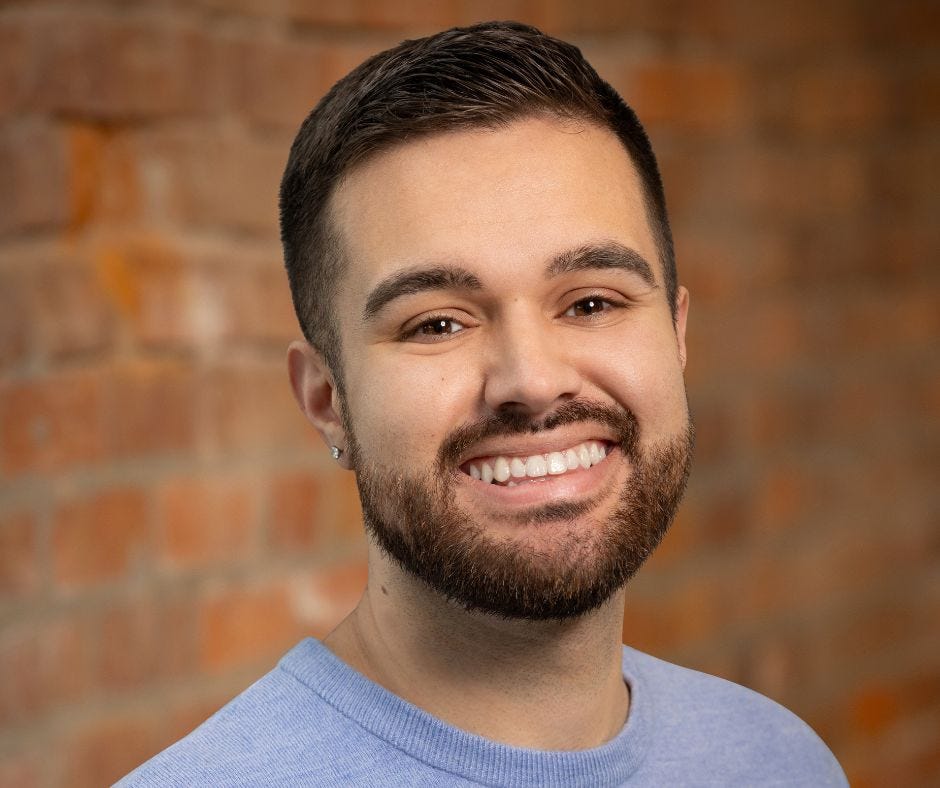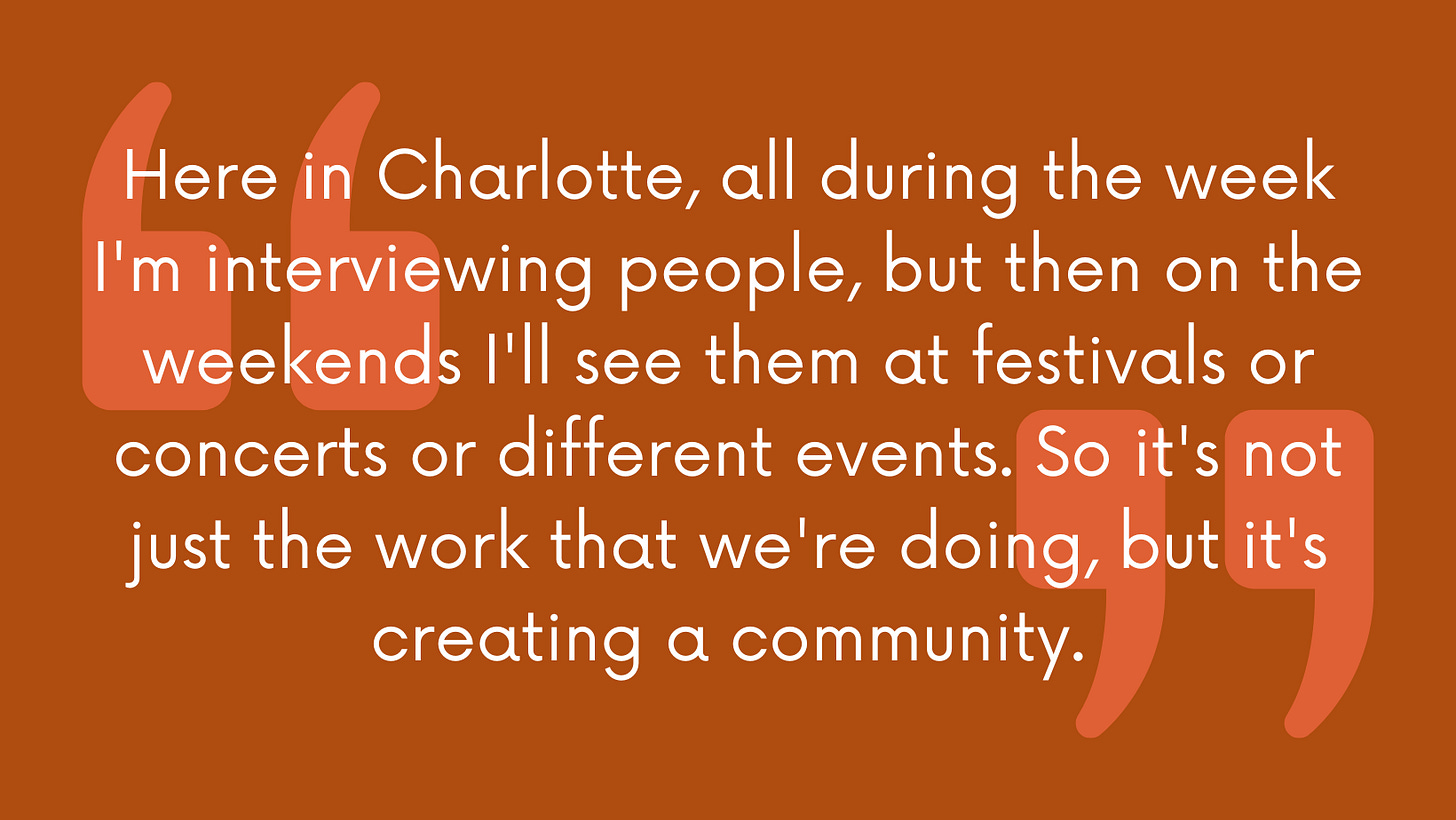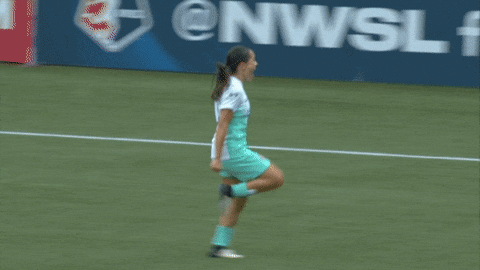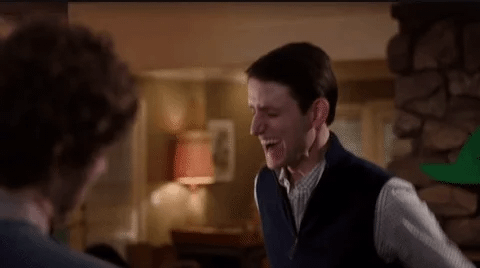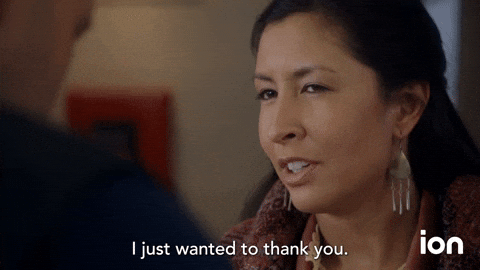Networks and neighborhood narratives
Julian Berger of WFAE reflects on authentic coverage of immigrant communities
If you’ve read OIGO for any length of time, you have probably seen me share WFAE as a station to learn from. WFAE’s Berger is oftentimes the reporter doing that work. This newsletter, I spoke with him about his journey and his approach to journalism.
Julian Berger is a bilingual journalist and storyteller based in Charlotte, North Carolina. He currently covers race and equity for WFAE, reporting on Latino and immigrant communities. Before joining public radio, he worked behind the scenes at NBC News NOW, CNN and NewsNation, helping shape national news coverage through scriptwriting, video editing and production support. Julian also serves as secretary of the Charlotte chapter of the National Association of Hispanic Journalists. A proud Puerto Rican born in New York, he uses his work to elevate the voices and issues often left out of mainstream coverage.
National media has often struggled to authentically represent local experiences while maintaining broad appeal. Berger's pivot to public radio represents more than career repositioning; it demonstrates how public media structures can provide space for nuanced, community-embedded journalism that some outlets often cannot support.
You may also appreciate how Berger's approach to covering Charlotte's Latino community presents a sophisticated understanding of cross-cultural dynamics. Rather than simply reporting to the community, he positions himself as a cultural translator, educating non-Spanish speaking audiences about the complexity and economic contributions of populations in loyal listeners’ own town. His maintaining constant communication with sources, attending community events beyond professional obligations, and challenging misconceptions creates a multi-dimensional engagement model. He’s addressing trust deficits while expanding the cultural literacy of audiences. I hope you’ll be heartened as much as I was in speaking with him.
What brought you to public radio?
I'm Puerto Rican and one of the big reasons why I got into journalism was because I didn't see enough of our stories being told in the news. So I went to New York, to NBC, and I was pitching so many Latino stories, so many stories that I thought were amazing and they would get rejected. The common theme was my stories tended to be localand the stories had to do with Latinos, with Hispanics, with immigrants.
A career opening came up with WFAE. It was a race and equity reporter position covering Latinos and the immigrant community.
I was raised in Charlotte. I moved here when I was 6. I lived here until I moved to New York when I was 22. So Charlotte's where I'm from. I know Charlotte really well. It was nice to be able to come back and report on a city that I grew up in that I knew and also report on my community, on the Latino community and the immigrant community.
That's a little bit about how I came to public radio and to WFAE, and it's funny because I never thought of myself as a public radio nerd until now. I'm really into NPR, I'm really into the work that we do at WFAE.
What lessons did you take from that work on the network level that you feel were most helpful to this transition for you?
I think it really helped me a lot to fine-tune everything and make sure everything was perfect. And now that I'm here at the local level, that's one thing I focus on a lot. I'm a perfectionist. I always make sure my script is perfect before I send it to my editor. I always make sure my audio sounds super clean. Before I publish my web story, I triple, quadruple read it, making sure there are no errors. I think that's something from the network level that I definitely brought with me that really helps me.
Is there framing or approaches to story building that you found helpful?
One of the things that I learned was just really knowing the community that you're reporting on—and not just because you want to report on them and then leave, but you really want to be embedded in the community. That's something at the network level and at the national level that I kind of felt like we were lacking. We were based in New York but for example, one of the stories that I did made me go to Miami. I was in Miami for a day or two and then I would leave and that was it. I never really spoke to the people that I was reporting on ever again.
I wanted to be embedded in the community and know the people that I'm reporting on. I wanted it to be a two-way street where the people I'm reporting on, where we're having constant communication; we're speaking; they're able to contact me, I'm able to contact them.
Here in Charlotte, all during the week I'm interviewing people, but then on the weekends I'll see them at festivals or concerts or different events. So it's not just the work that we're doing, but it's creating a community. And that's what I enjoy about being back here at the local level.
What is something most people around the country would be surprised by if they heard about the Latino community in Charlotte?
When I first moved to Charlotte, everybody thought that Latinos here in Charlotte were undocumented. So, as I said, I'm Puerto Rican, and we were asked numerous times, "Do you have your green card? Are you a legal citizen? Are you undocumented?" Just like everywhere else in the country, the Latinos in Charlotte, we're not just Mexican, we're not just Central American. There's such a huge diverse population of Latinos here in Charlotte. We're getting a big wave now of Colombians, of Venezuelans, of so many other countries of origin that are coming into Charlotte. We have a big younger generation that's coming in through our school system and that makes up the biggest chunk. We're a mixture of so many different groups.
How has Charlotte changed in terms of industries that are there, reasons that people move there from now compared to your earliest days?
We've always been a big banking hub. We have Wells Fargo, we have Bank of America. Aside from that, I've just seen the amount of immigrant-owned businesses that have come up here in Charlotte. And I think that's one big thing to be proud of.
When I first moved here to Charlotte, there were a lot of immigrant businesses, but the number of immigrant businesses here has quadrupled. It's really amazing to see how an immigrant, regardless of your documentation status, regardless of what country you come from, you can make a business here and that it can prosper and do really amazing things.
You've done so much reporting for WFAE, from business, to education, to schools, to cultural events, entrepreneurship. How do you approach your sources and how do you look at your reporting based in this community?
In the position I'm in, we have so many Spanish language newspapers that tend to cover the Latino, the immigrant community. They're the ones doing the work for our own community. But the way I see my role is educating others who don't speak Spanish, who are white, who are Black, who are South Asian, who are not a part of our community. So I'm trying to inform them about our community and what's going on, especially now with the mass deportation promises that are happening, and how much of a big impact that's having on education, on the economy. I tend to look at my reporting in that way of trying to inform people who are not in most cases a part of our community.
We have a big chunk of Latinos that do listen to WFAE, but a majority are white, and are not Spanish speaking. So I'm giving another lens into our community. I get that a lot. A lot of people will be like, "Wow, I didn't know that about the Latino community. I didn't know that about the immigrant community. Thank you for shining a light on it." That's one of the biggest things in my role now.
Given that, as you pointed out, you're not in a news desert. You've got a lot of organizations available that present stories to the community in their own languages. Do you feel like what you're doing is really public media's potential strategic advantage?
I feel that my job is to inform the people who don't speak Spanish, the people who are not Hispanic or Latino, who are not immigrants, who may have these misconceptions about our own community. I hope that my reporting challenges those misconceptions that they have and they can actually be like, "Wow, an undocumented person is not a criminal. They're contributing economically to our community. They have all these small businesses that are excellent, that are providing so many services to our community." So that's my mentality that I come into this role with. Just offering a voice of the Latino immigrant community who in most cases probably don't speak English and are not able to challenge these misconceptions.
What advice would you give to public media organizations around the country looking to cover communities better?
The biggest thing is trust. There's been a lot of mistrust between the communities and media. So really trying to gain that trust. One of the biggest things in my role is just having constant communication with my sources, with the community that I'm reporting on. The first thing that I did when I came into this role is I emailed all Latino stakeholders in Charlotte. I sent individual emails. "Hey, my name's Julian Berger." If I had met them before, I'd be like, "Hey, remember, we met on this day. Now I'm back." And "I'm reporting in Charlotte. I would love to sit down, get a coffee with you or do a virtual Zoom just to talk. Here's my information, my email, my cell phone number. Reach out whenever you want to." A lot of people have done that and we're in constant communication now.
It's so beneficial because that's how you learn. It's beneficial in the long run for your reporting.
Aside from my job, I want to be a part of the community, a good person, and want to have connections with these people, aside from filing my stories and all of that. In public media, we want to make sure that we're going the extra mile and that our reporting is informed. Also, we're very careful with what we say and that we shine a light on the sources that we're covering, that we're speaking to. Sometimes that means holding them accountable, and people appreciate that back and forth that you have with them. 🟢
Disclosure: This interview was conducted before WFAE’s staff reductions. Julian Berger is still with WFAE.
Cafecito: stories to discuss ☕
Alt.Latino aniversario. NPR has a nice piece about the 15th anniversary of its Latine music podcast Alt.Latino. 🍾
More aniversarios. WMNF highlighted the work of DJ Franco Silva, whose program Latino 54 celebrates 30 years on the airwaves. 🎉
LatidoBeat. A Local Media Association effort funded by the Google News Initiative is aimed at being a new platform for Spanish-language publishers. 👀 It kicks off with sign-ons from La Opinión from Los Angeles), New York City’s El Diario, La Raza of Chicago, La Prensa de Houston, La Prensa de Orlando, El Comercio de Colorado and Charlotte’s La Noticia.
New programming. Community radio station WTBR’s Spanish-language program was profiled by local media. 📻
Chisme. Axios details the fight between TelevisaUnivision and Google over what the broadcaster calls a “Hispanic tax.” 🥊 At issue is the removal of Univision from the core YouTube TV package, and shifting it to a Spanish-language add-on for an extra $15 per month.
American attitudes. Pew Research Center has fresh data on U.S. views of undocumented immigration. 📈
Post DEI. Nieman Lab has a wide-ranging analysis of newsrooms’ diversity efforts today.
El radar: try this 📡
Tap into local Hispanic businesses. With Hispanic Heritage Month almost here, many stations may be turning content plans to covering this cultural and political moment. 🔍 WOSU spends time with local industry and talks with them about how the headlines are affecting business.
Talk about immigration worries in context. WUNC has a good local story on how residents are appraising the climate and how it affects Hispanic Heritage Month celebrations. 😔
Offer a look a Latinos in country. WPLN covered the start of the Country Latin Association, an industry group to network and promote Latine country performers. 🎵 Regional Mexican and other styles have long been influenced by country aesthetics, and this is likely more prevalent than we recognize.
Inquire about local coffee parties. A recent NPR pieces has been carried by many stations, for good reason. 🎁 Freddy Monares’ story spotlights alcohol-free gatherings in Seattle’s Latine neighborhoods and it offers a shot of joy and curiosity. Well worth telling this one everywhere.
Shed light on area salsa fans. Did you hear The World’s story on how salsa has found a home in New York City? It’s a warm tale, and one that any station could localize. 🎸
Use food as a welcome and a prompt. KQED featured this story as well as an in-person event spotlighting the mastery of and love for empanadas. 🍽️ Who doesn’t love empanadas?! Everyone adores them, which makes it a lively engagement.
The next OIGO arrives Sept. 26. A report back on the 2025 Public Media Content Conference awaits you, featuring an update from the launch of Avanza. Station leader Edgar Zuniga has impressive insights and some inspiring work they’re doing in the community and online.
I release a resource guide next month for producers interested in getting on public radio. 🎙️ Carriage one of the most common questions I get, and this is a big moment for those wanting to join broadcast schedules. Read the details and share your thoughts.
Correction: I’d previously credited pieces by Lionel Ramos to KGOU, but it’s actually KOSU. Lo siento.



